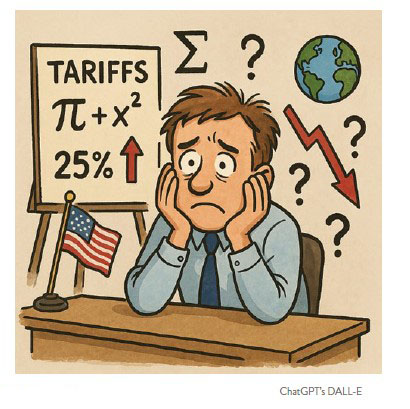
“April is the cruellest month…” When T.S.Eliot wrote those words in “The Waste Land”, I’m not sure he had our current calamity in mind, but it feels appropriate given the wild ride that has been April 2025.
Trump’s shock to financial markets arrived with showman’s pageantry, complete with Greek symbols, props, and “math” equations. But what was on those tariff charts on “Liberation Day” was potentially grave indeed, for the damage that could be done if implemented as announced, and for the assault on the rules and norms of globalization.
But this article is not about tariffs. For more of that fare, read Eric’s article on “Globalization in the crosshairs.” This page is about what to do when we really don’t know what to do. Because that is where we are. There is a wide range of possible outcomes, some of them extreme, and it’s hard to weigh the odds of any one of them coming to pass.
On one extreme, the trade war could go off as originally announced (maybe the revolution was televised, after all). In that case, we might expect the first order impact of lower economic growth, higher prices, lower consumer spending, tighter credit, and uncertainty hamstringing the ability of individuals and corporations to plan. In short, recession. The second order impacts could be even more damaging: an erosion of trust in the U.S.-built system of trade, a preference to move capital and investment away from the U.S., and the diminishment of the U.S. dollar and U.S. Treasuries – all at a time when the U.S. has financed its growth by issuing a lot of debt.
Alternatively, this could all be a Trump tactic to eke out progress on the Administration’s goals and the all-in tariff rate may be back to business-as-usual by the end of the year. My unhelpful take is that we will end up somewhere in the middle of those two extremes. Not because I can game out all the intricate preferences and constraints of the global players involved, but because I believe Trump has shown our allies and trading partners the he wants radical change. Under such conditions it would be foolish for governments around the world not to look for alternatives.
So what do we do? We have never seen this crisis before, but we have been through others. In times like these, panic and fear are not the answers. Above all, the one thing we want to avoid is finding ourselves in a position where we need to sell under duress at unfavorable prices. So if you have big cash needs in the next year or two, best to raise cash now.
With that taken care of, we can be prepared to look for opportunities amid the chaos. There will be losers and there will also be winners – potential bargains to be had, and companies or sectors that benefit from a changing world.
If investment flows change, where does that money end up? If more regional infrastructure needs to be built and new trading blocs emerge, who is going to be involved? These are the questions we are considering as we try to understand the new rules of the global game.